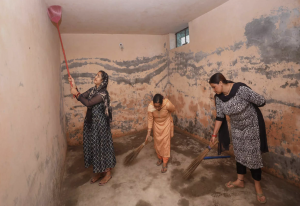JAMMU: Residents along the international border have started digging out subterranean bunkers that have been built over the years as a place to take refuge, following days after Pakistani Rangers breached the truce by attacking forward posts and communities along the border. The residents are calling for more of these buildings to be built so they may escape the cross-border shelling, and a big cleaning operation is in progress to make the bunkers livable. Sarpanch of Treva village in Arnia, Balbir Kour, said, “We cannot trust Pakistan and have started a drive to clean the bunkers to make them usable.”India and Pakistan have a 3,323 km border, with Jammu and Kashmir hosting 221 km of the IB and 744 km of the Line of Control. The people who live near the LoC and the IB experienced a great sense of relief when India and Pakistan declared on February 25, 2021, that a new ceasefire would be implemented along their borders in Jammu and Kashmir. A ceasefire deal was first signed by the two nations in 2003, but Pakistan routinely broke it; in 2020, there were over 5,000 recorded violations, the most in a single year. The Centre has approved the construction of 14,460 individual and communal bunkers in five districts of Jammu, Kathua, and Samba in December 2017 to protect the people along the border from Pakistani fire. These districts included the villages along the IB and Poonch and Rajouri villages on the LoC. Later, the government authorised more than 4,000 more bunkers for the population that was most at risk. A BSF jawan and a lady were hurt during the about seven-hour-long Pakistan Rangers firing in the Arnia area of the R S Pura sector on Thursday night. This was the first significant ceasefire breach since 2021. Two BSF men were hurt on October 17 when Pakistani gunfire targeted their post.In the midst of intense gunfire and mortar shelling on Thursday night, many terrified individuals—including migrant labourers harvesting paddy—ran to safer locations but later returned home when the guns stopped firing. During two flag meetings in the last ten days, the BSF and its Pakistani counterparts have already voiced a strong objection, emphasising the necessity of maintaining the ceasefire in the greater interest of peace and tranquilly along the border. Kour urged the locals to care for the bunkers like their homes, saying, “After 2018, our villages were pounded with mortars, but we could not use most of the bunkers because we paid no attention to their cleaning.” She claimed that before to the truce, the populace had experienced the worst. “I’m worried about the safety of the residents of this panchayat. We currently have seven communal and fifteen individual bunkers, but more are required to protect every home within the Pakistani shelling range.” Locals claim that most of the bunkers are covered in wild vegetation and floods, which serves as a haven for snakes and other deadly insects. They also lack electricity and restrooms. “Almost all of the community bunkers have been cleared,” ward number five resident Prerna stated.Nirmala Devi had never been fired by Pakistan before, so this was a novelty for her. “If we keep the bunkers clean, we need not flee our villages amid shelling.” In order to evaluate the loss, Jammu Divisional Commissioner Ramesh Kumar visited the border villages on Saturday with a group of senior civil and police officials, including Inspector General of Police, Jammu Zone, Anand Jain. In addition to Arnia, residents of Jammu, Samba, and Kathua who live near the border have also begun cleaning the security bunkers in their communities. During his visit to the areas impacted by Pakistan, President Rattan Lal Gupta of Jammu province led a team of the National Conference that criticised the government for “not doing enough” to protect the border population. “Despite being built with great fanfare, the bunkers are now worthless because of inadequate upkeep, which has left most of them submerged under rainwater. The government’s inaction has resulted in the depletion of the public coffers due to the bunkers’ apparent lack of value, according to Gupta.


